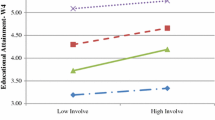Abstract
Recently, researchers at the National Research Center on the Gifted and Talented completed a three-year study of thirty-five economically disadvantaged, ethnically diverse, talented high school students who either achieved or underachieved in their urban high school. In this article, the results are discussed of the case study analysis of nine high-achieving female students who participated in the larger three-year study. Qualitative methods were used to examine the perceptions of students, teachers, and administrators about the reasons that some academically talented students achieve at high levels. Female students who achieved in school acknowledged the importance of being grouped together in honors and advanced classes for academically talented students, and of receiving support and encouragement from each other and from supportive adults, including teachers, guidance counselors, coaches, and mentors. Females who achieved in school participated in multiple extracurricular activities both after school and during the summer. Most high-achieving females in this study chose not to date in order to be able to concentrate their energies on their studies. They also had a strong belief in self and were resilient about negative aspects of their families and their environment. Although parents of students in this study cared deeply about their children, their involvement in their children's high school education was minimal.
Similar content being viewed by others
REFERENCES
Bland, L. C., Sowa, C. J., and Callahan, C. M. (1994). An overview of resilience in gifted children. Roeper Review 17: 77–80.
Bogdan, R. C., and Biklen, S. K. (1992). Qualitative Research for Education: An Introduction to Theory and Methods (2nd ed.). Boston: Allyn & Bacon.
Callahan, C. M., Cunningham, C. M., and Plucker, J. A. (1994). Foundations for the future: The socio-emotional development of gifted, adolescent women. Roeper Review 17: 99–105.
Cordeiro, P. A. (1991). An Ethnography of High Achieving At-Risk Hispanic Youths at Two Urban High Schools: Implications for administrators. Paper presented at the Annual Meeting of the American Educational Research Association, Chicago, April 3–7.
Erickson, F. (1986). Qualitative Methods in Research on Teaching. In M. C. Wittrock (ed.), Handbook of research on teaching (3rd ed.). New York: Macmillan.
Fine, M, (1991). Framing Dropouts. New York: State University Press.
Fordham, S. (1988). Racelessness as a factor in black students' school success: Pragmatic strategy or pyrrhic victory? Harvard Educational Review 58(1): 54–84.
Fordham, S., and Ogbu, J. U. (1986). Black students' school success: Coping with the “burden of ‘acting white’” Urban Review 18(3): 176–206.
Kline, B. E., and Short, E. B. (1991). Changes in emotional resilience: Gifted adolescent females. Roeper Review 13(3): 118–121.
LeCompte, M. D., and Goetz, J. P. (1982). Problems of reliability and validity in ethnographic research. Review of Educational Research 52: 31–60.
Lincoln, Y. S., and Guba, E. G. (1985). Naturalistic Inquiry. Beverly Hills, CA: Sage.
Lincoln, Y. S., and Guba, E. G. (1990). Judging the quality of case study reports. Qualitative Studies in Education 3(1): 53–59.
Marshall, C., and Rossman, G. (1989). Designing Qualitative Research. New York: Sage.
McMillan, J. H., and Reed, D. F. (1994). At risk students and resiliency: Factors contributing to academic success. Clearing House 67(3): 137–140.
Miles, M. B., and Huberman, A. M. (1994). Qualitative Data Analysis: An Expanded Sourcebook (2nd ed.). Thousand Oaks, CA: Sage.
Ogbu, J. U. (1974). The Next Generation: An Ethnography of Education in an Urban Neighborhood. New York: Academic Press.
Ogbu, J. U. (1985). Research currents: Cultural-ecological influences on minority school learning. Language Arts 62(8): 860–868.
Ogbu, J. U. (1987). Variability in minority school performance: A problem in search of an explanation. Anthropology and Education Quarterly 18(4): 312–334.
Ogbu, J. U. (1991). Immigrant and involuntary minorities in comparative perspective. In M. A. Gibson and J. U. Ogbu (eds.), Minority Status and Schooling: A Comparative Study of Immigrant and Involuntary Minorities (pp. 3–33). New York: Garland.
Pollard, D. S. (1989). Against the odds: A profile of academic achievers from the urban underclass. Journal of Negro Education 58(3): 297–308.
Reis, S. M. (1987). We can't change what we don't recognize: Understanding the special needs of gifted females. Gifted Child Quarterly, 31(2): 83–88.
Reis, S. M., Callahan, C. M., and Goldsmith, D. (1995). Attitudes of adolescent gifted girls and boys toward education, achievement, and the future. In K. D. Arnold, K. D. Noble, and R. F. Subotnik, Remarkable Women: Perspectives on Female Talent Development (pp. 209–224). Cresskill, NJ: Hampton Press.
Rutter, M. (1981). Stress, coping, and development: Some issues and some questions. Journal of Child Psychology and Psychiatry and Allied Disciplines 24(4): 323–356.
Scott-Gregory, S. (1992, March 16). The hidden hurdle. Time, pp. 44–46.
Spradley, J. (1979). The Ethnographic Interview. Chicago: Holt, Rinehart & Winston.
Spradley, J. P. (1980). Participant Observation. New York: Holt, Rinehart & Winston.
Strauss, A. L., and Corbin J. (1990). Basics of Qualitative Research: Grounded Theory Procedures and Techniques. Newbury, CA: Sage.
Trueba, H. T. (1988). Culturally based explanations of minority students' academic achievement. Anthropology and Education Quarterly 19(1): 270–287.
Werner, E. E. (1984). Research in review: Resilient children. Young Children 40(1): 68–72.
Wolin, S. J., and Wolin, S. (1994). The Resilient Self: How Survivors of Troubled Families Rise above Adversity. New York: Villard Books.
Yin, R. K. (1994). Case Study Research: Design and Methods (2nd ed.). Thousand Oaks, CA: Sage.
Author information
Authors and Affiliations
Rights and permissions
About this article
Cite this article
Reis, S.M., Díaz, E. Economically Disadvantaged Urban Female Students Who Achieve in Schools. The Urban Review 31, 31–54 (1999). https://doi.org/10.1023/A:1023244315236
Issue Date:
DOI: https://doi.org/10.1023/A:1023244315236




